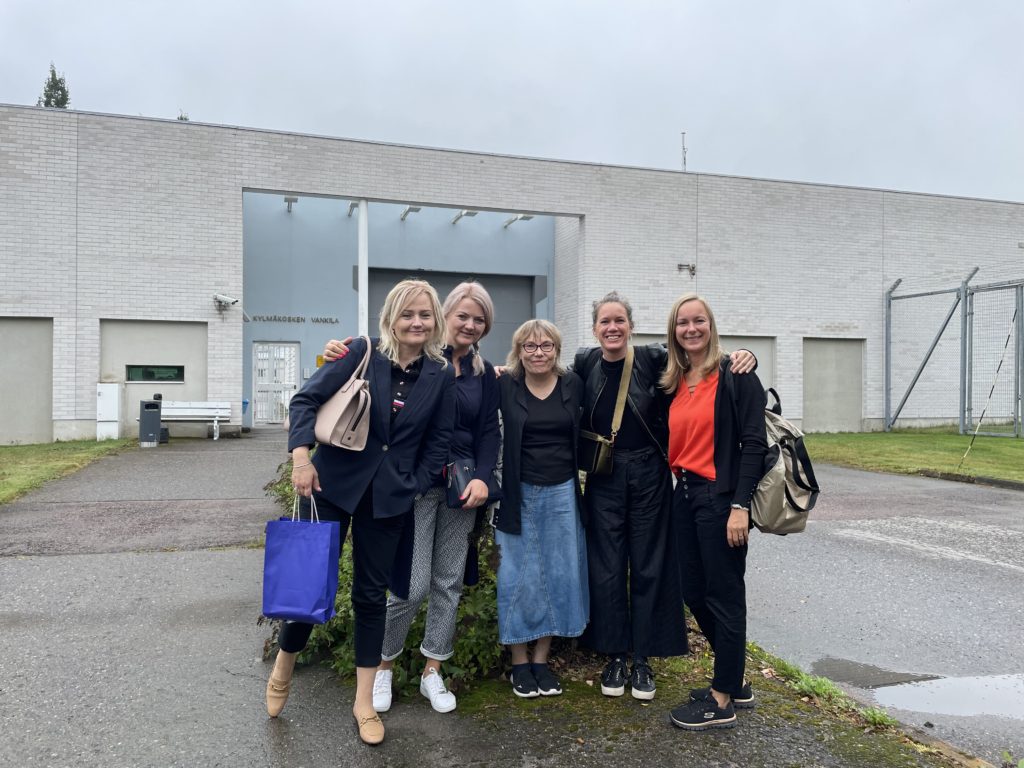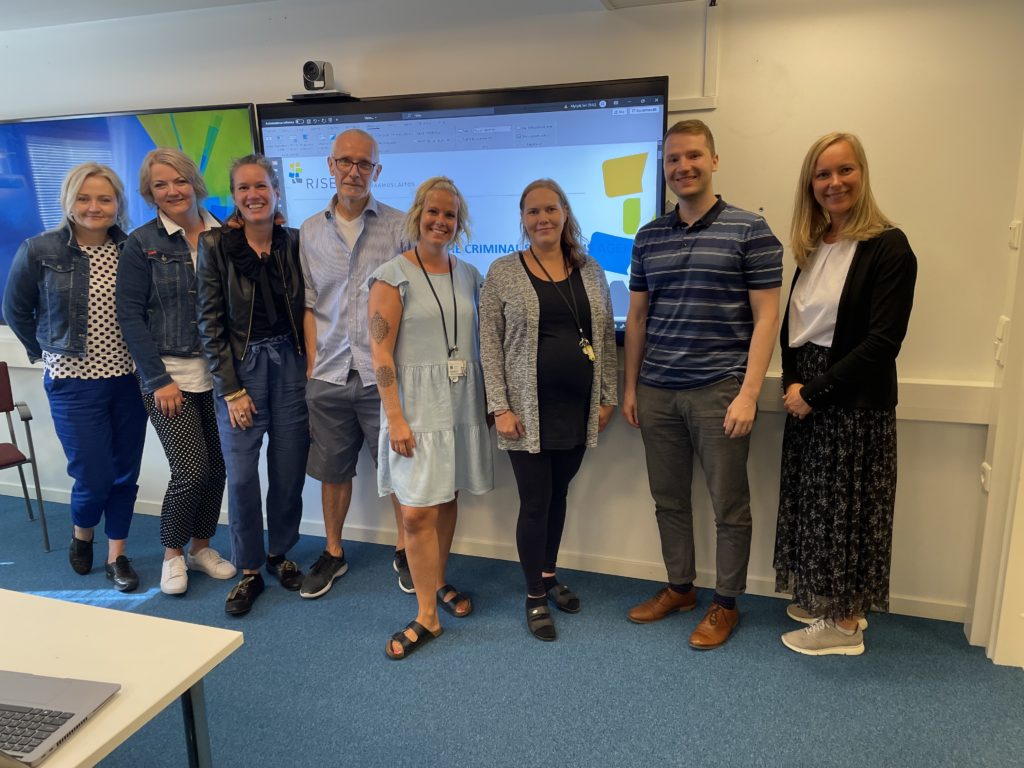
Many of our supporters and those interested in information on current trends in restorative justice had the opportunity to watch the Finnish documentary Eye to Eye, which presents the meeting of the bereaved with those who took the lives of their loved ones. In the past year, we screened the film in seven locations throughout the Czech Republic , and we are planning at least two more screenings before the end of 2022.
In the debates with experts and the public that always follow the film screenings, we often talk about the needs of the bereaved, their emotions, the ways in which they cope with the overpowering reality and healing, the reactions of the offenders and the possible risks of such restorative meetings. At the same time, we always hear that such a service is not available in the Czech Republic, that it is simply missing.
- One of our long-term goals is to support and promote mediation or, more precisely, restorative meetings and dialogue at any stage of criminal proceedings, or even after its termination, and for all types of crime, including most serious offences.
:In Finland, 13,000 to 15,000 mediations take place each year, mostly in cases of criminal proceedings (at various stages), carried out by 1,000 volunteer mediators who are methodically guided by 120 employed mediators in a total of 19 offices throughout Finland.
Thanks to the support from the Erasmus+ Small Scales grant, we are implementing the JUSTIN project in cooperation with the Slovak Ministry of Justice, the Finnish Criminal Sanctions Agency (RISE), the Belgian Moderator and the European Forum for Restorative Justice, which will support the development of restorative meetings in serious crime in Czechia and Slovakia through various activities. We have already reported on the initial activity of the project (preparation of the Report on the state of mediation in Czechia and Slovakia and the launch of the project in Bratislava in June 2022).
Last week, together with two colleagues from Slovakia, we had the opportunity to go on a study trip to our Finnish colleagues, so that we could discuss in detail the experience with restorative meetings as we know them from the documentary film Eye to Eye and other sources.
:u003cstrongu003eRestorative wards u003c/strongu003eare currently established in three prisons and offer group programs emphasizing elements of restorative justice (increased empathy towards victims; awareness of the effects of crime on specific victims or survivors; acceptance of responsibility and guidance towards possible reparation). The program often includes u003cstrongu003emeetings with specific victims or survivors u003c/strongu003ewho talk about the consequences of the crime, how their lives have changed, what they must deal with, and how they benefited from meeting the murderer of their beloved ones. At the same time, u003cstrongu003ethe operation of the entire department is guided by restorative values, disagreements between prisoners and staff are resolved restoratively u003c/strongu003e– together in a group or circle, which strengthens the sense of justice in resolving conflicts and responsibility for one’s behavior, helps to make a positive change and determination to change one’s life. This wasu003cstrongu003e confirmed by a former client of the ward u003c/strongu003ewith whom we had the opportunity to speak in Kylmäkoski prison. Of course, serious violations of the rules are dealt with according to the law or internal rules of the prison.
In Tampere, Finland, we were welcomed by the facilitator Arja, whom you know from the documentary, and on the first day we spent a lot of time discussing the system of mediation, probation work in connection to the professional work in prisons, as the implementation of these agendas differs from the Czech and Slovak practice. Mediation is provided by organizations under the Finnish Ministry of Social Affairs and Health, while probation and prison sentences are administred by the Criminal Sanctions Agency falling under the Ministry of Justice of Finland. Restorative meetings in prisons in serious crime cases were piloted between 2013 and 2018 and continue as part of the cooperation of the above-mentioned organizations and are provided by three experienced facilitators. In most cases, they are contacted by offenders serving a prison sentence who, as part of their professional work in prison, are led to accept responsibility for criminal activity, or are direct clients of one of the so-called restorative wards that operate in several Finnish prisons.

The restorative process in serious crime cases in Finland
:u003cstrongu003eObjectives of the preparatory phase of the restorative process – participants:u003c/strongu003ernu003culu003ern tu003cliu003eThey are aware of the meeting’s goals and of each other’s expectationsu003c/liu003ern tu003cliu003eThey have a realistic idea of what the meeting will look likeu003c/liu003ern tu003cliu003eTheir concerns were discussed and addressedu003c/liu003ern tu003cliu003eThey have the opportunity for follow-up support from the facilitators after the meetingu003c/liu003ern tu003cliu003eIt is clear to them that they can withdraw from the restorative process at any timeu003c/liu003ernu003c/ulu003e
Following the inmate’s request for a restorative meeting – otherwise also formulated as “a process leading to the processing of the effects and consequences of a serious crime after sentencing” and initial consideration of the suitability of the case, a personal meeting with the imprisoned offender takes place, always attended by two facilitators. Fundamental to the continuation of the process of preparation for the meeting is the fact that the offender does not deny guilt and at the same time accepts responsibility for his/her actions. Details of the offender’s motivation are ascertained; the specific stages of the restorative process are discussed, and the rules of the whole cooperation are established. The facilitators then contact the victim or the survivor and discuss the possibilities of cooperation with them personally. The preparation for a specific meeting of the participants in prison usually takes several months or even a year, as both parties need the face-to-face meeting to be carried out in a confidential, safe environment and at the right time for all involved.
During the meeting itself, the intervention of the facilitators in the dialogue between the survivors and the offender is minimal, most of their tasks have been fulfilled in the preparatory stages. They essentially have two responsibilities during the meeting – to maintain a safe environment for all involved with their calm and reassuring presence, and to stay out of direct dialogue unless intervention is necessary to maintain a safe environment.
After the meeting, the participants meet the facilitators separately usually after 14 days and three months after the meeting, so that they can share their feelings and the longer-term effects of the meeting on their future lives. Facilitators can possibly mediate futher meetings if both parties agree and consider continuing dialogue on the given topics to be beneficial.
Survivors most often report after a restorative meeting that:
The meeting was beneficial for them
They had the opportunity to clarify many of their questions or thoughts about the circumstances of the crime or the offender’s motives
The meeting relieved them of their hateful feelings and the need for revenge
Their feelings of shame and guilt are significantly lower after the meeting
They no longer have to worry about the offender being released from prison and then possibly meeting him
They no longer need therapy as the causes for the crime became clearer to them after the meeting
After a restorative session, offenders often report that:
The meeting brought them the opportunity to put things in order in their lives
It helped them forgive themselves, understand themselves better
It helped them deal with the consequences of their actions, to some extent
From now on, it will be easier for them to return to normal life
:u0022I understood that only I can make my life happy and not someone else.
Of course, the implementation of such meetings also brings a number of challenges also in Finland, for example, at the beginning of the implementation of the programme, it is necessary to convince and reassure the survivors and especially their families that the process is carried out solely with the needs of the victims in mind, regardless of who initiates the process. Also, the creation of a safe environment and the right timing of meetings for all is essential. Similarly, while victimology associations were initially suspicious of these meetings, good practice now shows that even bereavement support services offer the possibility of a restorative process if they see that they can benefit a particular victim or survivor. Words such as ‘forgiveness’ or ‘apology’ need to be used very sensitively so that their true content is well understood. It is sometimes very difficult to contact family members if the offence took place many years ago. It has proved essential that the provider of such a service is neutral and impartial. The funding of such services is also a challenge and, according to Finnish colleagues, will be more stable if the mediation system is brought under the Finnish Ministry of Justice.
“I can finally mourn the death of my brother… I don’t think of the person who did it to him as a monster anymore… He regretted what he did from the beginning and it was not his intention to kill anyone.”
:There are approximately 2800 people in prison in Finland, the total population is around 5 million…
In Kylmäkoski Prison we had the opportunity to talk not only with the workers of the restorative wards, but also with the surviving Mrs. Stina, who also appears in the documentary Eye to Eye. She talked about her first reaction to the facilitator ‘s offer of a restorative meeting (three years after the crime), when her first thought was that if the offender wanted to apologize to her, it had to be in person, so she could tell if he was serious. She wanted to tell him what her daughter’s death meant to her in life, what their family situation was like, and how it affected her son as well. And that she chose to talk with the offender despite the fact some of her friends and extended family dissuaded her from it. Even on the car ride to meet the offender in prison, she felt a certain sense of victory that she had faced this difficult situation in her life and was firmly convinced that meeting her daughter’s killer would help her cope with pain and grieving.
“I wanted to tell him that I would never be a grandmother and it used to be my great wish to be a grandma.
In the weeks following the restorative meeting in prison, she felt some relief in her life, feeling stronger to make major decisions about her life. She continues to share her story as she returns to the prison and talks to the restorative ward staff about her experience.
“I went to meet a man, not a murderer”

We are now processing all the information and experience from our study trip to Finland and proceed with the realization of the JUSTIN project in training future mediators in serious crime cases in Czechia and Slovakia, which includes preparation of relevant methodological materials. We will inform you about further progress and results in the News section and on the the JUSTIN project subpage.